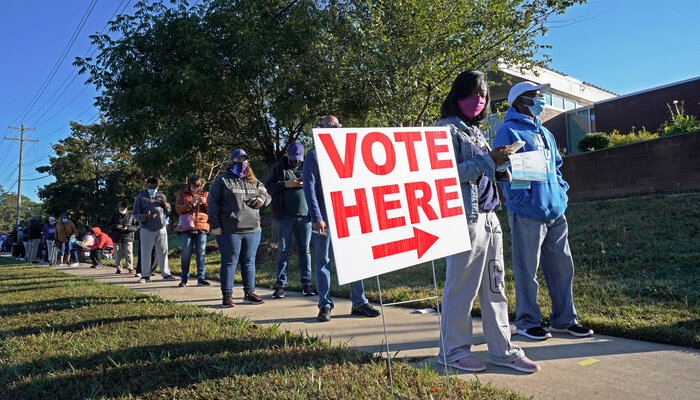Since the 2020 election, lawmakers from across the country have introduced a spate of legislation that severely restricts people’s freedom to vote. Recent reports underscore how voters of color and voters with disabilities are disproportionately impacted by these restrictive voting laws, building on a mountain of research documenting the racially disparate impacts of restrictive voting policies more generally.
Many of the bills introduced and laws enacted include provisions making it harder to cast a ballot by mail.
- An analysis conducted by NPR, GPB, and WABE showed that a Georgia law (S.B. 202) restricting ballot drop box access disproportionately impacted voters of color during the state’s 2022 primary. The reduction in drop box availability has substantially increased travel times for voters who want to use them, particularly in communities of color and areas with low vehicle ownership, which tend to have a majority Black population.
- Mother Jones documented that after Georgia’s S.B. 202 shortened the time voters have to request mail ballots, Black Georgians who submitted late mail ballot applications in 2021 made up half of all rejections despite making up only a third of eligible voters in the state.
- According to a Brennan Center report, in Georgia’s 2022 general election, the turnout gap between white and nonwhite voters was the widest it had been in the past decade, and the turnout gap between white and Black voters was roughly double the size observed in the past two midterm elections. The gap also grew dramatically in the 2022 federal primary in Georgia. It is possible that some of S.B. 202’s provisions, such as limiting mail-in voting and drop box usage, disproportionately discouraged or prevented voters of color from turning out.
- The Department of Justice and numerous civil rights groups are suing Georgia on the basis that the newly enacted S.B. 202 includes provisions that are discriminatory toward Black voters.
- Brennan Center research shows that as a result of new requirements imposed on mail voters under Texas’s S.B. 1, mail ballots and mail ballot applications were disproportionately rejected for nonwhite Texans. Overall application and mail ballot rejection rates for Black and Latino voters were more than a third higher than those of white voters. The rejection rate for Asian voters was more than 60 percent higher than the rate of rejection for white voters.
- The Texas Tribune similarly found that in the wake of TX S.B. 1, thousands of mail-in ballots were rejected at rates between 6 percent and 22 percent in Texas’s largest counties.
- The Brennan Center found that Arizona’s enactment of S.B. 1485 puts Native American and Latino voters at a disproportionate risk of being dropped from Arizona’s Permanent Early Voting List compared to other groups, and overall, nonwhite voters are more likely to be removed than white voters in the state. The Arizona Mirror came to similar conclusions.
- An analysis by Michael C. Herron, an expert in election administration at Dartmouth College, showed that a Florida law (S.B. 90) restricting drop box accessibility would impose greater burdens on Black voters compared to other groups based on data from the 2020 election.
Recent state bills and laws also include restrictions on helping voters register to vote or cast a ballot.
- A piece from the New Yorker emphasized how numerous restrictive voting laws in the wake of the Supreme Court’s ruling in Brnovich v. DNC, which weakened the protections of the Voting Rights Act of 1965, has worsened voting access for those who live on Hopi, Navajo, and Apache reservations in Arizona. Since the reservations often contend with a lack of transportation, unreliable internet access, and the underfunding of election offices, the recent restrictions on curing ballots and prohibitions on out-of-precinct voting, outside funding for election offices, and delivering ballots for friends and neighbors will disproportionally disenfranchise Native American voters in Arizona.
- An article from AZ Access and the Pulitzer Center found that 2022 voter turnout among the Hopi nation was dismally low. This was partially due to the difficulty of registering to vote given the scarcity of technology in rural areas of the Hopi reservation and the inconvenience of needing to travel long distances to reach a polling place.
- ProPublica showed that restrictive laws that prevent voters from receiving help when casting their ballot or registering to vote, like those recently passed in Texas and Florida, disproportionately reduce turnout in counties with low literacy rates. Due to structural inequality, impacted voters are more likely to be poor, Black, and Latino.
- Daniel A. Smith, an expert on voting rights and chair of the University of Florida’s political science department, used data from the 2020 general election to show that the burden imposed by Florida’s S.B. 90, which limits voter registration efforts by third-party organizations, would disproportionately impact Black and Latino residents compared to white voters.
A number of states introduced and enacted laws making voter identification laws stricter.
- The Atlanta Journal-Constitution showed that restrictive voter ID bills, such as Georgia’s S.B. 202, will suppress the votes of the state’s Black residents, as Black voters are overrepresented among the 3.5 percent of registered voters in Georgia without a qualifying state ID number or driver’s license.
Several states proposed or enacted legislation allowing more partisan control of election administration.
- Reuters covered how multiple county election boards in Georgia had their Black members purged after S.B. 202 passed, and what quickly followed was the elimination of Sunday voting — a voting method disproportionately favored by Black voters statewide in the 2020 election — in one county.
States introduced bills and passed laws that restrict Election Day voter registration.
- An article and legal complaint filed in Montana explained how a law (MT H.B. 176) ending Election Day voter registration will create additional obstacles to voting for some of the state’s most vulnerable populations. The cessation of Election Day registration, which has been used by tens of thousands of Montanans since its implementation in 2006, will be particularly devastating for those with disabilities who may be unable to register to vote by less accessible methods offered prior to Election Day.






